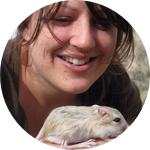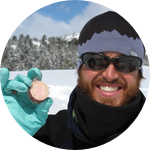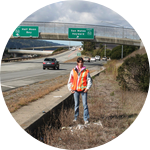About This Project
Small animals are hit by cars every day, (sometimes whole families at a time), because roads and highways were built with little or no thought to surrounding wildlife. Nowadays when transportation projects are planned, larger species are more often considered than small species because they pose more of a threat to drivers. This school year we're enlisting High School students to record and provide small-species carcass data to CA transportation agencies for use in planning.
Ask the Scientists
Join The DiscussionWhat is the context of this research?
Highway collision records show 25%+ of wildlife reported hit are left injured. CA transportation agencies often use limited or outdated information on species in road planning, and even if there is no information projects continue anyway, leading to negative environmental impacts. Usually, they won't study the effects of roads on wildlife unless there’s a known need or mandate (i.e. endangered, threatened, special concern species) in which case projects happen in ways to reduce negative effects. Since the agencies will use information when it is readily available the small-species carcass data students collect will be given directly to road planners for consideration in transportation projects. UC Davis Road Ecology Center (REC) will also house all data for anyone to request and use.
What is the significance of this project?
The (REC) studies roadkill and wildlife-vehicle incidents. Out of 70,000 records of incidents in CA they say over 400 of the 600+ terrestrial Californian species are negatively impacted by cars. San Francisco Bay Area’s SFPUC watershed is home to an endangered snake and abuts one of the deadliest highways for wildlife in CA. Santa Cruz Mountains have several endangered salamander and frog species, some noted dead on local roads and Highway 1.
Students on this project will learn college-level skills and gain experience working with local and state government processes by providing small-species carcass data to transportation and wildlife agencies, increasing small-species considerations in transportation planning, ultimately reducing our collisions with animals.
What are the goals of the project?
Small-species carcass data would be gathered every month, vetted, and put into CROS. Students will share data with CA transportation and wildlife agencies to use in upcoming and future transportation planning/construction projects. We will also report endangered or species of concern information as it's found.
For the ’17-’18 school season we will pilot this in areas with no data or other priority-indicators with an approach used successfully by Maine Audubon as part of their Maine Audubon Wildlife Road Watch, which also includes active data-sharing with state agencies.
Incidentally the REC also allows teachers and others to request the roadkill data for other purposes and we know the more data, the better!
Budget
Transportation:
Driver license laws in California may prohibit most participating students from being on the road with other students in the car to collect roadkill observations. Additionally participating schools have unique needs to transport students. Bus rental costs vary, some up to $125/hr. 3 hours = $375, some rentals cost $340 for 5 hours. 5000 would allow about 13 trips over the course of the school year.
Project Coordination, Organizer & Communications Manager, 12 months:
- Collaboration management between state agencies, schools, and UC Davis Road Ecology Center on most aspects of the project.
- Fundraising, marketing & promotion.
Materials: To help with costs of local student presentation projects
Present at conference, 2019: Travel and registration expenses
Endorsed by
 Project Timeline
Project Timeline
This project takes place over the course of the school year, starting September 2017 and wrapping up June, 2018.
Throughout the project students will perform data collection and sharing, learning how to interact with CA transportation agency processes to submit information for consideration in road and highway projects.
Lab notes will include significant findings and how we're able to get transportation agencies to plan around small species information in order to keep them off our roadways.
Aug 31, 2017
Project Launched
Sep 15, 2017
Data gathering kick-off! Highways/Roads assigned
Sep 22, 2017
Existing CA species of concern literature review
Dec 01, 2017
1st Trimester - Data Round Up - Report findings to the area Caltrans biologist
Mar 02, 2018
2nd Trimester - Data Round Up - Report findings to the area Caltrans biologist
Meet the Team
Team Bio
Fraser and Kathryn began working together in 2009 on a wildlife-movement study involving multiple state agencies.
Dr. Fraser Shilling oversees the California Roadkill Observation System (CROS), the largest roadkill repository in the US. He has worked extensively in data sharing to assist in road planning.
Kathryn's past experiences in building collaborations will be put to use to build relationships between state agencies and students. Her goal? Grow the program.
Kathryn Harrold
I am currently a citizen scientist and student preparing to transfer to a UC in 2019 or 2020.
I began working on highway-wildlife conflict in 2009 helping the UC Davis Road Ecology Center (REC) attain a grant to perform a 2-year study of wildlife movement on Highway 280 in the SF Bay Area. I helped build the inter-agency team, learned camera-trapping, conducted project coordination between Caltrans, UC Davis, Dept. of Fish and Wildlife and others, and contributed roadkill sightings to the California Roadkill Observation System which I continue to do.
From 2015 -2017 I contributed to a study carried out by the REC on the application of remote, wireless camera systems for Environmental Monitoring of Transportation Corridors. In particular comparing cellular transmission cameras to non-cell cameras for wildlife monitoring along highways.
In 2015 I began work on ongoing data analysis of reported collisions in California, deciphering how wildlife are specifically impacted, and co-presented along with Dr. Fraser Shilling our initial findings, "The Truth About Roadkill," at the 2017 Urban Wildlife Conference.
I currently lobby for wildlife crossings for the worst highways for collisions in California.
Fraser Shilling
I study the ways that ecology and other sciences can support sustainability decision-making. This is primarily in areas of transportation ecology, water, and wildlife biology.
Lab Notes
Nothing posted yet.
Additional Information
Students will learn to work with the California Department of Transportation's public input processes to submit species information, they will also work with the UC Davis Road Ecology Center's California Roadkill Observation System for data input.
Roadkill data also informs us about things like health of local species, presence of invasive species, and is valuable in many other ways. We expect a natural off-shoot of this project could be that data collected can open ideas and doors for similar or related ecology projects.
Various small-species related road and highway solutions have been used in California, the related literature will be gathered and shared.
We aim to expand this project in 2019 to many more roads and highways in California or elsewhere in the US.
Project Backers
- 4Backers
- 1%Funded
- $51Total Donations
- $12.75Average Donation




